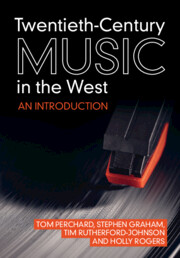Book contents
- Twentieth-Century Music in the West
- Twentieth-Century Music in the West
- Copyright page
- Contents
- Figures
- Tables
- Acknowledgements
- Introduction
- Part I Histories
- Part II Techniques and Technologies
- Part III Mediation
- Part IV Identities
- 13 Gender and Sexuality
- 14 Race and Ethnicity
- 15 Audiences, Class and Consumption
- 16 Centres and Peripheries
- Bibliography
- Index
14 - Race and Ethnicity
from Part IV - Identities
Published online by Cambridge University Press: 15 September 2022
- Twentieth-Century Music in the West
- Twentieth-Century Music in the West
- Copyright page
- Contents
- Figures
- Tables
- Acknowledgements
- Introduction
- Part I Histories
- Part II Techniques and Technologies
- Part III Mediation
- Part IV Identities
- 13 Gender and Sexuality
- 14 Race and Ethnicity
- 15 Audiences, Class and Consumption
- 16 Centres and Peripheries
- Bibliography
- Index
Summary
This chapter explores twentieth-century music’s entanglement in various racial and ethnic (or national) struggles. We start by looking at the concepts of ‘essentialism’ and ‘constructivism’, two ideas that shaped how music was talked about and experienced in the period. We extend that discussion in turning to ethnicity and nationalism in twentieth-century music. Our first case study examines Béla Bartók’s (1881–1945) folk-song collecting through the lens of national and ethnic identity. We then discuss the concept and traditions of Black music in the twentieth century, in turn looking at the post-human in Black and white music in our second case study. The final section draws together previous discussions in looking at end-of-the-century transnational musics as symbols of changing racial, ethnic and national dynamics. We should acknowledge the complexity of ‘race’ and ‘ethnicity’ at the outset. Though the shorthand of race as biology (physical characteristics) and ethnicity as culture (customs tied to heritage or nationality) is useful, it masks a more complex reality where race is shaped by cultural experience, and ethnicity can refer to shared physical as much as cultural characteristics.
- Type
- Chapter
- Information
- Twentieth-Century Music in the WestAn Introduction, pp. 341 - 361Publisher: Cambridge University PressPrint publication year: 2022

